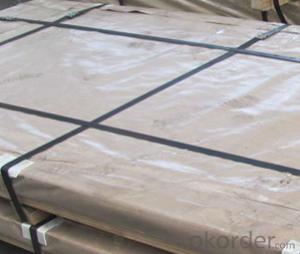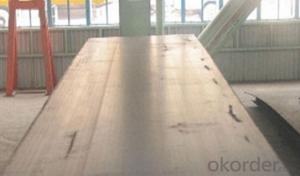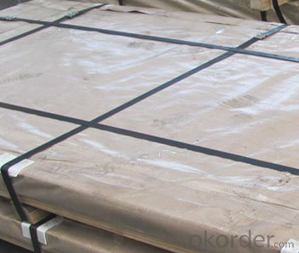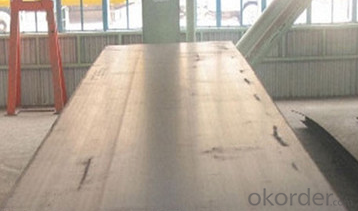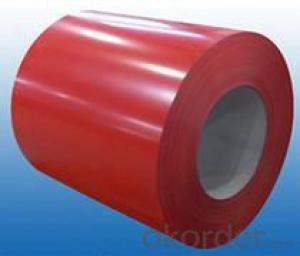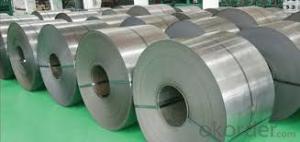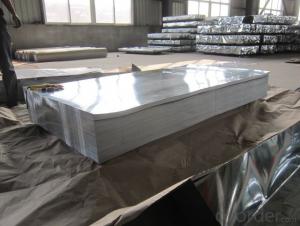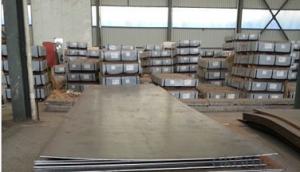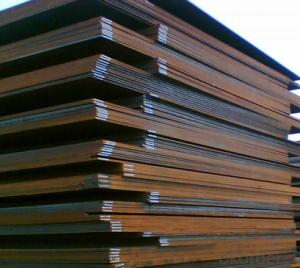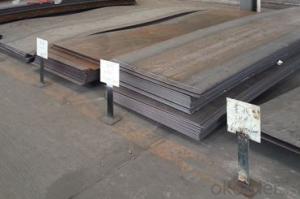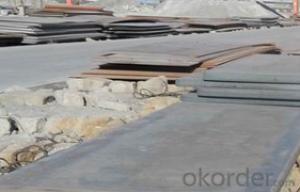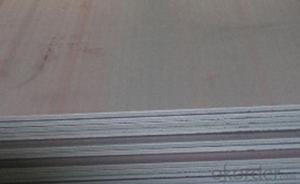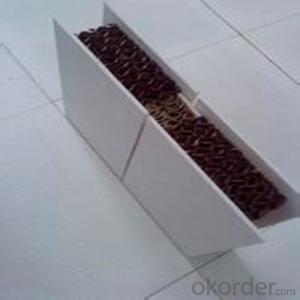Hot Rolled Carbon Steel Sheet A709 CNBM
- Loading Port:
- Qingdao
- Payment Terms:
- TT OR LC
- Min Order Qty:
- 10 pc
- Supply Capability:
- 30 pc/month
OKorder Service Pledge
Quality Product, Order Online Tracking, Timely Delivery
OKorder Financial Service
Credit Rating, Credit Services, Credit Purchasing
You Might Also Like
Quick Details
| Standard: | AISI, ASTM, DIN, GB, JIS | Grade: | A572,A573,A633,A678,A709,A710,G3101,G3136,etc | Thickness: | 1mm-200mm |
| Brand Name: | SHOU GANG GROUP, AN STEEL | Model Number: | Q235 | ||
| Type: | Steel Plate | Technique: | Hot Rolled | Surface Treatment: | Coated |
| Application: | widely | Special Use: | High-strength Steel Plate | Width: | 1000mm-3000mm |
| Length: | 1000mm-12000mm | Price Term: | FOB CIF CFR |
Packaging & Delivery
| Packaging Details: | standard seaworthy export packing or as the request of customers |
| Delivery Detail: | 10 days after deposit or according to customers' quantity |
Specifications
hot rolled carbon steel sheet
1.Thickness:1mm-200mm
2.Length:1000mm-12000mm
3.Width:1000mm-2000mm
hot rolled carbon steel sheet
| Product | HR steel plate prices carbon steel plate prices per kg |
| MOQ | 25 ton |
| Thickness | 1mm-200mm |
| Width | 1000mm-3000mm |
| Length | 1000mm-12000mm |
| Application | widely |
| Standard | AISI,ASTM,BS,DIN,JIS,GB,etc |
| Grade | A572,A573,A633,A678,A709,A710,G3101,G3136,etc |
| Tpye | Steel plate |
| Surfacing | Coated |
| Productive Technology | Hot Rolled & Cold Rolled |
| Port | |
| Payment Terms | L/C,T/T,Western Union,MoneyGram |
| Product Ability | 5000 tons per month |
| Delivery | 10 days after deposit or according to customers' quantity |
| Packing | standard seaworthy export packing or as the request of customers |
- Q: What is the difference between a matte and glossy steel sheet?
- The main difference between a matte and glossy steel sheet lies in their surface finish. A matte steel sheet has a dull, non-reflective surface that diffuses light, resulting in a more muted appearance. On the other hand, a glossy steel sheet has a smooth, reflective surface that reflects light, giving it a shiny and polished look.
- Q: Can steel sheets withstand extreme temperatures?
- Yes, steel sheets can withstand extreme temperatures. Steel is known for its high melting point, which is around 1370°C (2500°F). This makes it suitable for use in environments with extreme heat, such as furnaces, kilns, and industrial ovens. Additionally, steel has excellent thermal conductivity, allowing it to efficiently transfer heat and resist thermal expansion and contraction. These properties make steel sheets resistant to warping, cracking, and other forms of structural damage that can occur under extreme temperature conditions.
- Q: Can steel sheets be used for automotive body reinforcements?
- Yes, steel sheets can be used for automotive body reinforcements. Steel is commonly used in the automotive industry for its high strength-to-weight ratio, durability, and ability to withstand impact and collision forces. Steel sheets can be shaped, molded, and welded to reinforce the body structure of vehicles, providing enhanced safety and structural integrity.
- Q: Can the steel sheets be bent without cracking?
- Steel sheets have the capability to be bent without cracking. This capability relies on several factors including the type and grade of steel, the thickness of the sheet, and the bending process employed. As a general rule, steel sheets can be bent without cracking as long as the bending radius and angle fall within the recommended limits specific to the type and grade of steel being used. Furthermore, preheating the steel sheet before bending can further mitigate the risk of cracking. It is crucial to adhere to proper bending techniques and utilize suitable tools to guarantee successful bending of steel sheets without any cracks.
- Q: What are the common sizes and thicknesses of steel sheets?
- Common sizes and thicknesses of steel sheets vary depending on their intended use and industry standards. However, some common sizes include 4x8 feet, 5x10 feet, and 6x20 feet. Thicknesses typically range from 0.4mm to 25mm, with the most commonly used thicknesses being 1mm, 2mm, 3mm, 4mm, and 5mm.
- Q: How do steel sheets perform in terms of electrical resistance?
- Steel sheets are generally poor conductors of electricity due to their high electrical resistance.
- Q: Are steel sheets suitable for cold storage applications?
- Yes, steel sheets are suitable for cold storage applications. Steel is a durable and strong material that can withstand the low temperatures typically required for cold storage. It is resistant to corrosion and does not absorb moisture, making it ideal for keeping the cold air inside the storage area. Additionally, steel sheets can be easily cleaned and sanitized, which is important in maintaining the hygiene and safety of the stored items. Steel also provides excellent insulation properties, helping to maintain a consistent temperature within the cold storage facility. Furthermore, steel sheets can be customized and fabricated to meet the specific size and shape requirements of the cold storage application. Overall, steel sheets are a reliable and practical choice for cold storage applications.
- Q: Are steel sheets prone to warping or bending?
- Yes, steel sheets are prone to warping or bending under certain conditions. Factors such as temperature changes, excessive weight, or improper handling can cause steel sheets to warp or bend.
- Q: What is the average thermal expansion coefficient of steel sheets?
- The average thermal expansion coefficient of steel sheets is typically around 10-12 x 10^-6 per degree Celsius.
- Q: What is the cost of steel sheets compared to other materials?
- The cost of steel sheets compared to other materials can vary depending on factors such as the type of material, size, thickness, and market conditions. In general, steel sheets tend to be more expensive than materials like aluminum or plastic, but they are also known for their durability and strength. Steel sheets are commonly used in industries such as construction, automotive, and manufacturing due to their high load-bearing capacity and resistance to corrosion. While steel sheets may have a higher upfront cost, they often provide a longer lifespan and require less maintenance compared to other materials. Additionally, the cost of steel sheets can fluctuate based on global supply and demand dynamics, as well as any tariffs or trade restrictions that may impact the steel market.
Send your message to us
Hot Rolled Carbon Steel Sheet A709 CNBM
- Loading Port:
- Qingdao
- Payment Terms:
- TT OR LC
- Min Order Qty:
- 10 pc
- Supply Capability:
- 30 pc/month
OKorder Service Pledge
Quality Product, Order Online Tracking, Timely Delivery
OKorder Financial Service
Credit Rating, Credit Services, Credit Purchasing
Similar products
Hot products
Hot Searches
Related keywords
